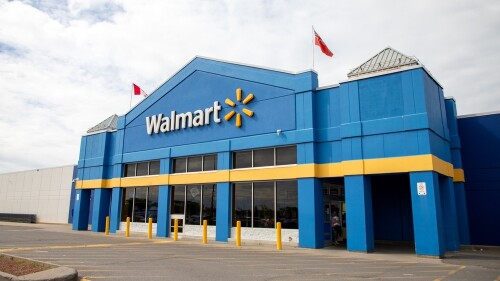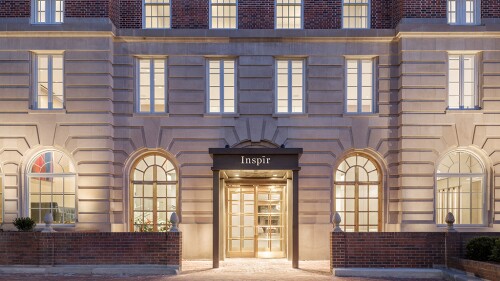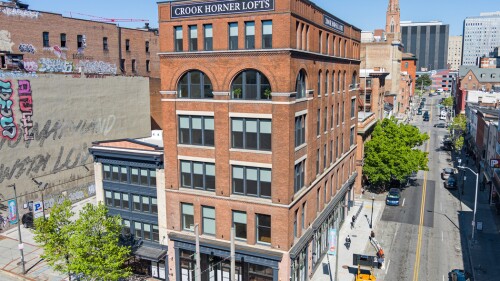The Washington, D.C., region is shedding its reputation as a stodgy government town and emerging as a forward-thinking mecca for technology firms and young professionals. With eyes on attracting projects such as Amazon’s second headquarters, area landlords, brokers, architects, and economic development organizations are teaming up to ink leases with both high-profile and homegrown tech firms.
Recently, ULI Washington hosted a panel discussion, moderated by ULI Trustee Anthony Chang of Washington REIT, discussing tech leasing achievements and aspirations in the metropolitan area.
Terrell Place is a 476,000-square-foot (44,200 sq m) office and retail complex at Seventh and F streets, N.W., in the heart of the District’s vibrant Penn Quarter. The property comprises three connected components: the historic former Hecht’s department store; a nine-story South Wing, incorporating four historic facades; and a connected 11-story office tower fronting F Street.
After Terrell Place was acquired by real estate investment firm Beacon Capital Partners, the building’s lead tenant, a law firm, moved out. Working with JLL and Gensler, the new owners launched a $20 million capital improvement project to “reintroduce” the property. “Tenants are looking for authenticity,” said Andrew Trueblood of the city’s office of the deputy mayor for planning and economic development, which provided several incentives for the new tenants.
“The building looked like K Street, but is located in the dynamic East End, and we wanted to embrace that,” explained Francisco Gonzalez, a principal with Gensler. “Tech tenants like to bring the outdoors in.” The building now offers a huge rooftop lounge with a “glass box” of sheltered indoor space, a wine bar, and a penthouse level with private “cabanas” for lead tenants.
Extending throughout the main level of shared spaces is a transformative installation of motion-activated media displays created by ESI Design. Powered by some 5 million LED lights on the lobby walls and corridor portals, the displays are activated by passersby via an infrared camera system. The newly renovated lobby also features a Compass Coffee café and “zones” for informal gatherings. Additional amenities are planned and underway.
The investments have paid off, said JLL’s Amy Bowser, garnering rents that compete with those of new ground-up development, and large leases from two tech companies that are household names. The Washington Business Journal reported that online review company Yelp leased over 50,000 square feet (4,600 sq m).
Focusing on technology means supporting local startups as well as attracting large firms that are expanding into new locations. Educational technology company 2U partners with colleges and universities to help them offer digital education, allowing students to earn advanced degrees without attending campus-based classes. As it grew rapidly, the company launched an area-wide search for new headquarters space.
With the help of Prince George’s County, Maryland, economic development official David Iannucci and Adam Schindler of Colliers International (formerly Serten Advisors), both of whom were on the ULI panel, 2U ended up moving less than a mile away to a 325,000-square-foot (30,200 sq m) strategically located office building that had been vacated by government contractor CSC.
“We latched onto this company as a way to help reinvent Prince George’s County,” said Iannucci. “I knew we had to keep them.” But it wasn’t easy, the three panelists agreed. As 2U worked through its conversion to a public ownership, the building—which had been assessed for $54 million—sold at foreclosure for $20.3 million. Multiple companies wanted to acquire it for residential conversion, but the county was focused on job growth.
“We realized that this building had no amenities,” said Jason Peterman, a senior director at 2U. “The only restaurant within safe walking distance was a KFC.” Incentives from both the county and the state of Maryland helped 2U create a custom headquarters space that meets the needs of its growing employee base and its unique culture—one that favors spontaneous dance parties. There is now an onsite café, open collaborative space, a refurbished auditorium, a state-of-the-art 12,000-square-foot (1,100 sq m) gym, and—of course—a dance floor.
Now, 2U’s building is surrounded by multiple residential and mixed-use developments that take advantage of the site’s transportation infrastructure, including the New Carrollton Metrorail and Amtrak stations, I-495, and I-50. The county has taken a statewide lead in job growth, and 2U’s modernized building has traded hands again, this time for $82 million.
There is no question that tech companies make great office tenants, agreed David Ritchey and Taylor Lawch of the recently formed JBG Smith Properties. But to attract new tenants to millions of square feet of office space in Crystal City, a neighborhood in Arlington County, Virginia, they are not putting all their eggs in the tech basket.
“We have a long history of placemaking in the District, and now we have a Super Bowl opportunity take those lessons learned to Crystal City,” said Ritchey. The Crystal City Business Improvement District, said Robert Mandle, its chief operations officer, aids in the placemaking effort by curating more than 300 events and programs per year. In the section of Crystal City recently rebranded as “North District,” JBG Smith plans to add substantial retail amenities, a new Metro station entrance, and improved pedestrian connections to Ronald Reagan Washington National Airport. “Urban amenities are what all tenants look for,” said Lawch. “Every neighborhood has its own DNA, but there are many commonalities.”





